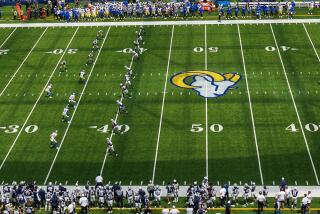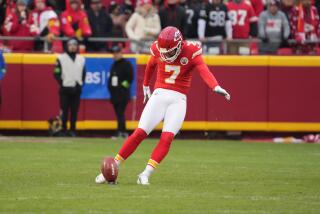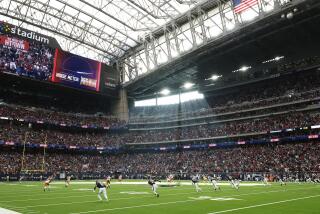No Flags for Replacements
Fred Wyant spent 27 seasons as an NFL official, so he was especially skeptical Thursday in watching the historic debut of a replacement officiating crew. It didn’t take him long to notice something that surely turned the stomachs of the locked-out regulars. “I wasn’t able to tell the difference,” he said.
No controversy. No embarrassingly bad calls. Frankly, no big deal. In what must have come as an enormous relief to the NFL, the hastily assembled replacement crews did a respectable job in Thursday’s six games.
“I’m ecstatic about the way things went,” said Larry Upson, the league’s director of officiating operations who worked the Philadelphia game.
Earlier in the day, the league extended its contract with the 120 replacements from two games to four, meaning each will receive a total of $8,000, even if the dispute with the NFL Referees Assn. is settled immediately.
“We’re still far apart, and there’s a good chance we’ll need [the replacements] to work those games,” said Greg Aiello, spokesman for the NFL, dealing with its first work stoppage among officials. Aiello said contract talks are expected to resume next week, although, as of Thursday afternoon, no plans were in place for a meeting between NFL Commissioner Paul Tagliabue and agent Tom Condon, representing the officials.
The league conducted one-day tutorials Wednesday in four cities--New York, Chicago, Atlanta and San Francisco--for the replacements, the majority of whom are college, Arena League and NFL Europe officials. Standard seven-man crews worked the games, although two or three alternates stood by at each and rotated in throughout. The crew working the Dallas-Jacksonville game was headed by longtime NFL referee Mike Pereira, the league’s supervisor of officials who returned to the field because of the lockout.
“I’d like for our fans to remember these officials officiating tonight around the NFL were just maybe a month or a year away from joining our officiating crews anyway,” Dallas owner Jerry Jones said.
In the second quarter of the Colts’ game in Cincinnati, the Bengals were flagged by two officials for having 12 men on the field. Referee Aster Sizemore announced: “Illegal participation--too many people on the field for the defense. Fifteen yards.” Moments later, he caught himself. “It’s a 5-yard penalty,” he said.
On the final play of the first quarter in Foxboro, Mass., Washington quarterback Jeff George intentionally grounded the ball from his goal line, a safety. Officials ruled he was in the end zone when it happened, but adjusted the call after studying the replay and ruled he was throwing from the 1. The Redskins retained the ball at their 1. There was no argument in Pittsburgh, when Steeler defensive end Aaron Smith sacked Buffalo’s Rob Johnson--ripping off his helmet in the process--and was called for unnecessary roughness.
The only glitch Wyant noticed in the Philadelphia-New York Jet game came when the referee reached on the wrong side of his belt line three times in a row, searching for his microphone button.
Former NFL referee Jim Tunney said the pressure of working exhibition games doesn’t compare to the spotlight of the regular season, which begins Sept. 9. “Next week they count,” he said. “You take away a touchdown from [Minnesota’s] Cris Carter, who’s chasing Jerry Rice, and you’ve got a problem. You take a sack away from [Tampa Bay’s] Warren Sapp and you’ve got a problem.
“When the bell rings next weekend, the coaches’ jobs are on the line. It’s an incredible pressure. In the preseason, it’s like, ‘Oh well, so what?”’
*
The Associated Press contributed to this report.
More to Read
Go beyond the scoreboard
Get the latest on L.A.'s teams in the daily Sports Report newsletter.
You may occasionally receive promotional content from the Los Angeles Times.











